Family Secrets: Kith and Kin
“Our village notices our village.”—Allan Gurganus
What Do You Do With an Idea by Kobe Yamada, a beloved book on my seven-year-old son’s bookshelf, posits the question:
What do ideas become?
Big things, brave things, smart things, silly things.
Things like stories, artwork, journeys . . .
And then I realized what you do with an idea . . . you change the world.
Commissioning new vocal music was a long-held but far-off idea in my mind. As a lifelong singer I’ve had many mentors who’ve had pieces written specifically for them. Many of these works have even become a major part of the canon or vocal repertoire. I thought to myself, “I think I could do that someday.”
I was living and singing professionally with the Hamburg Kammeroper in Germany when I found myself deeply homesick and ready to return to the States, specifically back home to North Carolina. Coming home meant more time with my wonderful parents, Alice and Joe Moore, who moved to the magical town of Hillsborough during my grad-student days at Yale and after my sisters and I had flown the coop. They were loving their new home in this fascinating and creative town. They introduced me to many of North Carolina’s most renowned authors and poets as well as other artists living right in town. I immediately felt my feet and heart rerooting themselves in the red Carolina clay.
Many in this community of writers and artists had occasion to hear me sing, since during this time I began teaching at UNC–Chapel Hill and became a regular on many a faculty concert program. I was also singing locally, sometimes on larger stages in grand concerts, operas, and chamber music as well as in the privacy of salon recitals. I even performed in a few community plays put on by Hillsborough’s own impresario and “music man” himself, Michael Malone.
Somehow Michael was able to rope all these amazing folks into a particular reading of Guys and Dolls. I sang the role of Sarah Brown and made merry alongside the likes of reluctant performing authors Randall Kenan, Daniel Wallace, and Michael himself. My own mother even joined the hotbox girls. It was a good time and I had become quite close with this group of players, so much so that Michael Malone eventually became my godfather.
Another writer, poet Jeffery Beam, invited me to a fateful lunch at Jujube in Chapel Hill after he had heard me sing Samuel Barber’s Knoxville: Summer of 1915. He wanted to share with me a vocal chamber setting of his poems by renowned voice composer Lee Hoiby, a piece one of his dear friends had commissioned. This was the tipping point for the kindling idea of commissioning my own new work.
When I allowed this idea to take shape I never dreamed it would grow into such a “Big . . . Smart . . . Silly thing.” But I did know it would indeed take a lot of bravery and be a journey of stories and artwork. And I wanted to unify this truly amazing community of writers and artists in some kind of musical snapshot of a small town.
- Authors Q&A
- Family of Authors
As a classical singer and recitalist one cannot sing without having a connection to great literature. Poetry, novels, and plays are the pillars upon which the entire opera, oratorio, and art song oeuvre stands. When my idea really started to emerge, it felt that I could go beyond solely commissioning the composer but also creating a new collection of poetry for the work. I was so fortunate to have developed these strong and trusting relationships with this writers’ circle and that they respected me professionally enough to respond enthusiastically and without question to writing new texts for this project.
Before I even knew who would compose the work I had already engaged a bevy of the South’s literary elite who all lived within a ten-mile radius from me: Frances Mayes, Lee Smith, Allan Gurganus, Michael Malone, Jeffery Beam, Daniel Wallace, and Randall Kenan. This magnificent group would dive in head first to create a communal collaboration that would not only represent diverse viewpoints but also a unity within our amazing community.
The challenging task of bringing seven voices together needed a theme and somehow right away “family secrets” felt like fertile ground for this crew. Great writers, especially Southern ones, seem to thrive on secrets and there always seems to be an endless supply of them. After all, what does one really want to do most with a secret? Tell it right away, of course.
Secrets hold a sense of place—they seem to dwell in the air once they are revealed. Thus I prompted each writer to consider a room in a house or an area of town where their secret lived, happened, or should be told. Frances Mayes chose the kitchen, Daniel Wallace the pantry, Michael Malone a town cemetery, Lee Smith the top of the stairs, Jeffery Beam the front porch, and Allan Gurganus went all over town with his raucous tales of gossiping gals.
The authors were already at work writing but I hadn’t yet settled on a composer who might be able to handle what was becoming a sizable and unconventional commission, when I reunited with my dear friend Daniel Thomas Davis, a brilliant composer and dear friend from our Peabody Conservatory days. In 2011, Dan hosted the New South Music Festival in his hometown of Waxhaw, North Carolina, and invited me to perform several of his recent works. I noticed his compositions retained echoes of his North Carolina upbringing, some intangible thread that I recognized and loved, no matter how probing his compositional work. We also seemed to be attracted to similar music and aesthetics, so I knew he’d be the perfect composer to take this project on, if he was willing.
A lover of words and song, Dan accepted the operatic challenge of piecing together this work. As he put it so well, “When I first started work on this unique collaboration, I received a voluminous amount of poetry and prose—a loose bundle of work by seven of the finest writers currently working in and around the Southern voices of American literature. As I slowly made my way through these stories and stanzas, I began to understand something I had already intuited—these writers all know one another. And one way or another, the people that inhabit their writings all seem to know one another, too.”
“When Andrea and I first discussed the possibility of me writing a piece that somehow merged these seven voices into a single musical work, we weren’t quite sure what the final form would be, but we knew that each writer created stories with a strong sense of place. We imagined that the seven scenes would, more or less, be united by a common musical language, but beyond that it would be some time for the ultimate structure to emerge. Would it be a chamber opera? A song cycle?”
When Dan sent the first draft of the score, I tore into it with excitement and I was immediately struck by his choice to compose a prologue and epilogue bookending the work with words from Allan Gurganus’s story, “Gossip.” Spoken/sung in a sprechstimme style, the opening line, “Our village notices our village,” invites the listener to case the town as a neighbor voyeur. Opening thirds in the piano knock at the neighbor’s door and sneak down stairs with creaky footsteps. It was instantly clear that Dan had begun to create music with deep understanding and compelling drama out of all that had been given to him.
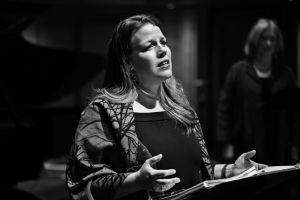
Andrea Edith Moore and Jane Holding. Cricket Photography.
His unique and unusual scoring for a soprano, a female narrator (eventually beautifully portrayed by the great Jane Holding, a great interpreter of Allan Gurganus’s works), violin, cello, oboe/English horn, piano, and the surprising addition of banjo evoked a sense of the sultry South while also opening into full operatic fervor. Henry Fogel of Fanfare magazine found that “the Southern tinge of a banjo adds curious sense of melancholy. . . . It is rare to find something as completely individual as this . . . a most impressive achievement, compositionally, in performance, and in recording.”
While Dan was already deep into composing the music, one author, Randall Kenan, continued to miss deadline after deadline—something I’ve since learned was not atypical for him. His genius short story writing made me continue to hold out for what I knew could be a brilliant addition to this project. I waited and felt as though I nagged and nagged—always leaving him room to bow out but he assured me he remained interested in participating. After an email with the subject line titled “Last Try?” Randall wrote, “I apologize for being so uncommunicative, and so SLOW. I think, at base, I felt strange about writing this down, and could not come up with the thing that lived in my imagination as a representation. So I am sending you what I have, misshapen and curious as it may be.”
Attached to the email was his chilling and terrible tale, “Chinaberry Tree,” the true story of the murder of his beloved aunt by his uncle as metaphorically witnessed by the tree’s million berries, “Like eyes, like a hundred thousand eyes.” He confided to us this story had never made it into one of his essays or memoirs and that he’d never wanted to contort it to a fictional version. When we approached him with the opportunity to offer it to a musical project he was comfortable that it might finally have found the right home. This story predates the horrifying murders of George Floyd, Ahmaud Arbery, Tyre Nichols, and so many others, as the whole world watched like the berries on the tree, however one can’t help but see the prescience and parallels of, as Daniel puts it, “Kenan’s bloodstained parable of the Great Migration.” As trees provide the balance and proportion of a landscape, so too did the “Chinaberry Tree,” in this series of dramatic portraits anchored in the gravity of its shade.
Dan and I knew we had received the centerpiece of this larger work and were now entering full-on operatic territory. The music in “Chinaberry Tree” serves as the thematic material for almost all the other music in the piece and the subtitle of “Kith and Kin” is also plucked from this text.
The sequence of stories fell into place. Following the prologue, Family Secrets: Kith and Kin opens the curtain on Lee Smith’s girl at the “Top of the Stairs” as she dances to the full ensemble spying on her big sister’s clandestine romance from up on her perch. The violin weaves a mellifluous threnody as Frances Mayes’s haunted lover is caught in the “Net” of her past relationship. A folksy fiddle and banjo mourn a deceased father as the bereaved mother and daughter lay on and tend to his grave in Michael Malone’s “Cemetery.” Ending the perceived first act, a romantically drunk cabaret piano provides jazzy humor to the narrator’s character by enticing her to climb higher and higher to find out what really was up in Daniel Wallace’s “Pantry.”
After a pause, the drama and devastation of “Chinaberry Tree” ensues with a blues influence ricocheting between the voices of the narrator and the soprano. This steam train of simmering then boiling drama comes down as the twangy banjo plucks over the hedges from the neighbor’s house, in Jeffery Beam’s “Porch Song,” offering solace and peace at sundown.
The grand finale of Allan Gurganus’s “Gossip” packs a walloping punch with his ever-hilarious juxtaposition of two redneck ladies gabbing away on the telephone about their affairs with men half their age. Finally, an epilogue of great humanity in the lines, “Everything the world does wrong, everything the world does best is found right here, but only by the watchful. . . . Can’t we each be saved from our worst selves?” These lines resonated so deeply and are so gorgeously rendered musically that we see beyond the smallness of this town in a denouement that washes over the listener as they process that this little village, their own home, and all its universal happenings could be anywhere and at any time in the world.
As I prepared the music for the premiere, these characters and secrets pierced my thoughts day and night. More and more I knew the music must be synthesized with visual elements rather than simply presented in concert form. The amazing town of Hillsborough once again provided the artistic trove of collaborators to enrich the physical setting of this chamber opera. Renowned photographer Elizabeth Matheson allowed me delve into her works and find images that we would eventually project in large scale with the music. Her work underscored the Southern gothic feeling to the interiors and exteriors of these texts.
- Warren House, Prospect Hill, NC Photo by Elizabeth Matheson.
- Old House. Photo by Elizabeth Matheson.
- Shell Castle, Enfield, NC. Photo by Elizabeth Matheson.
- Porch. Photo by Elizabeth Matheson.
- Coolmore, Tarboro, NC. Photo by Elizabeth Matheson.
- Chinaberry Tree. Photo by Elizabeth Matheson.
Additionally, selected pieces from Steven Burke and Randy Campbell’s magical, fantastical, and largest-known collection of American folk art buildings allowed us to create a vignette of a village onstage. These images and objects were used in the concert premiere, deepening and enhancing the effect of Dan’s powerful music. For the staged premiere with the North Carolina Opera, I brought video artist and director Francesca Talenti, a newer Hillsboroughan, on board to add scope to the scenery. Francesca staged Jane and myself in our movements and relationships, and unified all the elements with fully dramatic projections that moved the listener through the village, its weather, and into and out of the interior spaces.
Family Secrets: Kith and Kin premiered to the world in 2015 in concert at the University of North Carolina and in 2018 in a fully staged operatic version with the North Carolina Opera.
In the summer of 2018, I attended a fellowship with multi-Grammy® award–winning contemporary musical sextet Eighth Blackbird. While there I met and got to know producer Elaine Martone who encouraged me to take this project to the next level and record it. I recorded this as my debut album in 2019 and released it on Albany Records in 2020 during the pandemic. Although it wasn’t an auspicious time to release a recording I was honored that it received a Grammy® nomination under Elaine Martone’s output and nod for Classical Producer of the Year. It is still my intention to bring this work to a much wider audience. A tour of Family Secrets: Kith and Kin was thwarted during the COVID years but will hopefully be revived, after all, as Robert Moore (no relation) of American Record Guide put it, “This is a slice of southern culture that could easily pass under your radar, and that would be unfortunate.” “A tender, intimate chamber opera, Family Secrets: Kith & Kin . . . is a patchwork quilt that offers 44 minutes of fascination, amusement, and character” (Fanfare ).
- Michael Tiemann and Andrea Edith Moore at Manifold Recording Studio. Crickett Photography
- Ian Schreier, Andrea Edith Moore, and Elaine Martone at Manifold Recording Studio. Crickett Photography.
What a Big, Brave, Smart and Silly idea this was, so full of stories and artwork. It was certainly a journey that changed my world.
Over the years and many iterations of this project my incredible team of musicians, artists, writers, and supporters grew into the village we were creating and we were truly rendered kith and kin. Tragically, this village has become smaller. We lost our great Randall Kenan in 2020 during the pandemic before he heard or could see the success of the album. Michael Malone, ever my cheerleader, passed away in 2022 after a fierce battle with pancreatic cancer. Before Michael died he made it clear that he wanted the Cemetery Song sung at his service. Doing my best to keep it together for Michael, for his wife Maureen and daughter Maggie, and for all of our community, I honored this request and sang him up to heaven in his own words:
Scene Three: Cemetery
—Michael Malone
Our daughter and I
Lie on the green grass under your tree.
Above our heads
Summer comes slowly
Clouds drift past us
And the sky turns gray then blue.
Rain on the leaves slides into the green grass.
Rain drops down from your tree.
Above our heads
Showers fall fitful
And then our child she asks me,
Is the rain sad, missing you?
Our daughter and I
Rake up the dead leaves
Our daughter and I
Under your tree
Above our heads
Winter moves quickly and nothing can last long.
Snow covers us both, as you used to do.








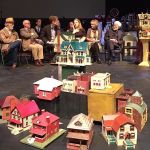
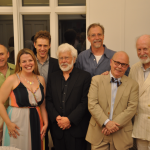


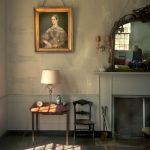
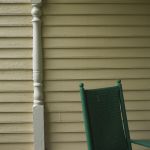
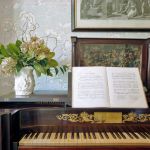



Impressive venture! Small towns are the best for community collaborations and Hillsborough certainly proves it!
My dear Andrea, What a beautiful telling of the making of FAMILY SECRETS! I so loved having a part. Thank you. Jane